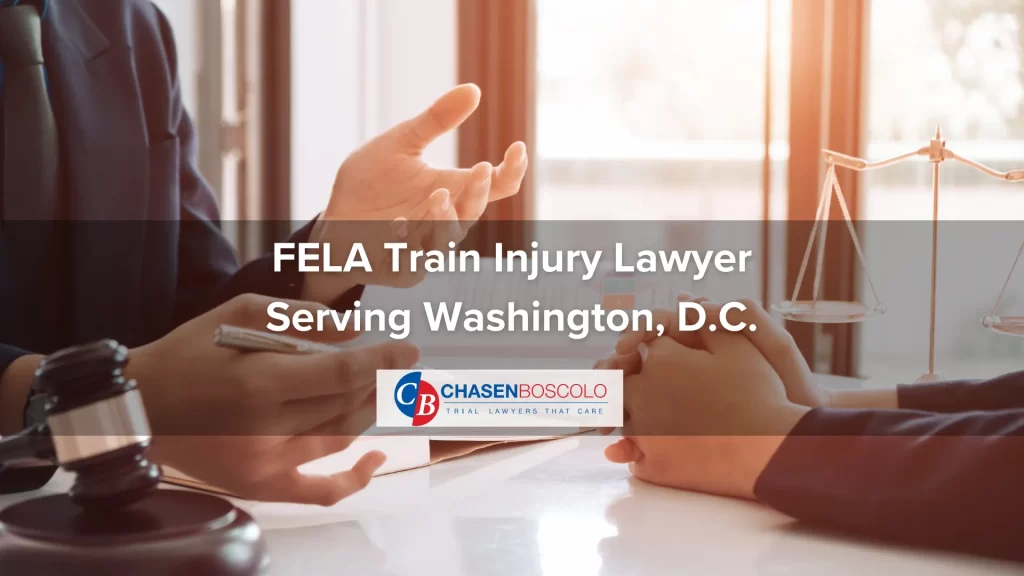
The Federal Employers’ Liability Act (FELA) is the federal law designed to protect and compensate railroad workers (commonly referred to as railroaders) who suffer injuries on the job. FELA is the exclusive remedy for injured workers filing suit against railroads.
FELA is similar to but not the same as workers’ compensation. While FELA can provide benefits to an injured worker, it does require proof that an injury was caused to some degree by the fault or negligence of the railroad.
FELA cases can be brought in either state or federal court. While negligence of a railroad can be difficult to prove in some cases, it is important to understand the simple failure to provide a safe place to work can constitute negligence.
Did you suffer catastrophic injuries or was your loved one killed while working on a railroad in Washington, D.C.? Do not think that you have to handle your FELA claim by yourself. An attorney can lift the burden of filing a claim from your shoulders, allowing you to focus on what is most important: your recovery. Our experienced FELA train injury attorneys will provide a thorough, honest evaluation of your case when you call (301) 220-0050 or contact us online to set up a free consultation.
Do I Need a FELA Train Injury Lawyer?
Chances are you will be contacted by a company representative or an insurance adjuster for the railroad soon after your accident, and you will want to be very careful with what you say. When insurance agents say they will take care of you and that you won’t need to hire an attorney, know that these are usually empty promises.
The insurance company may inform you that a claims adjuster has been assigned to your case and that they will be conducting an investigation. As part of this investigation, the adjuster will usually ask the victim to provide a recorded statement. You should always decline because recorded statements are frequently traps designed to get people to unknowingly admit fault.
Some insurers are going to argue that victims are not entitled to any compensation because their injuries were the result of their negligence or the railroad was not negligent in any way. You will want a lawyer for help proving the railroad’s negligence.
An insurance company might also offer you a lump sum settlement to resolve your case, but this offer is assuredly far less than what you are entitled to. You will need an attorney for help in securing a fair and full settlement.
Why Choose CHASENBOSCOLO To Handle My Case?
CHASENBOSCOLO is available 24 hours a day, seven days a week, so you will never have a phone call go unanswered. Our firm has recovered hundreds of millions of dollars for thousands of clients since 1986.
Barry M. Chasen has over 30 years of legal experience and is a member of the American Association for Justice, Maryland State Bar Association, and Maryland Association for Justice. He is also a past chair of the Maryland State Bar Section on Negligence, Insurance, and Workers’ Compensation who has received an AV Preeminent rating from Martindale-Hubbell.
Benjamin T. Boscolo also received an AV Preeminent rating from Martindale-Hubbell, a peer rating denoting the highest level of professional excellence. He is a Workers Compensation Panelist for both the National Football Players Association and Major League Soccer Players Association.
Our firm also provides every client with the No Fee Guarantee® so you will not be expected to pay anything until you obtain a financial award. CHASENBOSCOLO will work toward a just settlement, but will not be afraid to file a lawsuit to take your case to trial when the insurance company does not extend a suitable offer.
Types Of FELA Train Injury Cases We Handle
 The kinds of accidents that railroad workers can be involved in vary depending on the specific nature of the work. In FELA claims, a railroad generally needs to have been negligent, which could either mean the railroad did something a reasonable and prudent person would not have done, failed to do what a reasonable and prudent person would have done, or was guilty of a lack of due care.
The kinds of accidents that railroad workers can be involved in vary depending on the specific nature of the work. In FELA claims, a railroad generally needs to have been negligent, which could either mean the railroad did something a reasonable and prudent person would not have done, failed to do what a reasonable and prudent person would have done, or was guilty of a lack of due care.
Some of the more frequent causes of railroad accidents include, but are not limited to:
- Trains moving too quickly
- Operator error
- Exposure to toxic chemicals and substances
- Improper training of workers
- Unsafe work conditions
- Improper procedures
- Failure to maintain equipment
- Poor lighting
- Defective equipment
A critical step for a railroad worker who is involved in an accident is to make sure that they get medical attention. This is true even when a person does not think that they were seriously harmed. If you wait several days or weeks to see a doctor, it can create a number of problems with insurance companies. Some insurers will be quick to claim that your injuries are not compensable because you did not treat them properly.
Common kinds of injuries railroad workers sustain on the job include, but are not limited to:
- Chemical exposure
- Fractures
- Respiratory issues
- Back injuries
- Spinal cord injury
- Lacerations
- Lung cancer
- Neck injuries
- Traumatic brain injury (TBI)
- Internal organ damage
- Mesothelioma
- Burn injuries
- Nerve damage
- Soft Tissue Injuries
- Paralysis
- Carpal tunnel syndrome
It is also possible that some railroad workers will die from their injuries. When a railroad worker is killed on the job, their family members could possibly have a wrongful death claim against the railroad.
Frequently Asked Questions About FELA Train Injuries
At CHASENBOSCOLO, we receive many questions from clients regarding their FELA train injury cases. We hope you find the following questions and answers useful. If you have any questions about your particular claim, contact our experienced train accident attorneys any time at (301) 220-0050.
How Long Do I Have To File A FELA Claim?
You have three years from the date of your accident to file a FELA claim. Not all of the injuries listed above are immediately apparent, however. With occupational diseases caused by railroad work, the statute of limitations will be three years from the date that the worker discovered or should have discovered the disease. Insurance companies are notorious for trying to have occupational disease claims thrown out because of time limits, so it is especially important for such victims to retain legal counsel.
What Is Comparative Negligence?
Comparative negligence is a principle of tort law under which the damages awarded in a personal injury case are determined based on the comparative negligence of both the defendant and the plaintiff. The good news for railroad workers is that FELA claims involve what is commonly referred to as a “featherweight” burden of proof, meaning that an injured railroad worker needs to prove that a railroad was partially, but not 100%, negligent. When the railroad worker’s negligence was a factor in their injuries, the damages will be reduced in proportion to their share of negligence. In other words, an injured railroad worker who is awarded $100,000 in a FELA claim but is found to have been 35% at fault for their injuries will have their award reduced by $35,000 and ultimately receive $65,000.
What Is Light Duty Work?
Most workers count on getting their hours in to support themselves and their loved ones, so time missed from work due to an injury can be financially crippling. Some of these workers could be offered light duty assignments. However, you need to be very cautious with your willingness to accept such offers. Make sure that your doctor approves of the work because agreeing to light duty work without medical clearance risks the possibility of aggravating the injury or possibly worsening your condition. Performing light duty in defiance of a physician’s recommendation could also lead to your FELA claim being denied.
FELA Train Injury Statistics
There were 8,470 accidents or incidents reported by 783 railroads in 2018, according to the Federal Railroad Administration (FRA). These accidents or incidents resulted in 660 fatalities and 5,954 nonfatal injuries.
Six fatalities and 178 nonfatal injuries resulted from 1,356 train accidents, 205 fatalities and 567 nonfatal injuries resulted from 1,579 highway-rail grade crossing accidents, and 449 fatalities and 5,209 nonfatal injuries resulted from 5,535 other incidents.
There were 119 passengers on trains, 49 railroad workers, three contract workers on duty, two non-trespassers off railroad property, two employees not on duty, two trespassers, and one other contractor who suffered nonfatal injuries in train accidents excluding highway-rail crossing incidents. There were also 291 non-trespassers, 176 trespassers, 56 railroad workers on duty, 34 passengers on trains, five non-trespassers off railroad property, three other contractors, and two contract workers on duty who sustained nonfatal injuries in highway-rail crossing incidents.
There were three trespassers, two railroad workers on duty, and one worker on duty who were killed in train accidents excluding highway-rail crossing incidents in 2018. There were also 135 trespassers, 69 non-trespassers, and one railroad worker on duty killed in highway-rail crossing incidents in 2018. Another 427 trespassers, seven railroad workers on duty, seven non-trespassers, three passengers on trains, two contract workers on duty, one other contractor, one volunteer worker on duty, and one non-trespasser off railroad property were killed in other incidents excluding highway-rail crossing incidents in 2018.
There were 1,836 total train accidents in 2018, according to the Bureau of Transportation Statistics.
Contact A FELA Train Injury Attorney In Washington, D.C.
If you sustained severe injuries while working on a railroad in Washington, D.C., know that our experienced attorneys are ready to help you get the compensation you need to pay your bills and get back on your feet. FELA claims are especially challenging to handle, so the train injury lawyers at CHASENBOSCOLO will be there to guide you every step of the way. Our firm can help you get the benefits and compensation you need and deserve. Call (855) 752-9146 or contact us online to take advantage of a free consultation.





